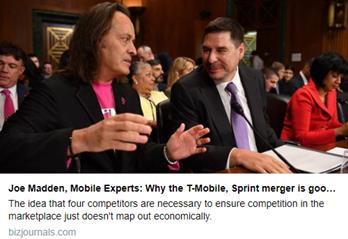Speaker:I think my question’s going to be directed toward Neville. It’s going into the process of streamlining the internet service providers. What are we going to be doing to play hardball with Comcast?
Neville Ray: For what reason?
Speaker: To be able to provide internet services to everybody.
Neville Ray: Ah, right. You mean for our network or for general, for customers?
Speaker: General customers.
Neville Ray: Yeah, I mean so, if you look at our 5G plans and what we want to go do, and the broadband story that’s there, we can absolutely go and attack the cable guys, Comcast, the whole shooting match, very, very aggressively. And it’s not just one ISP connectivity. When you think about what we’re going to do with bundling Layer3 and we go after the other major source of their revenue, their TV content. So, if they’re listening and watching what we’re doing, you see them moving into wireless, right? So, they realize that sitting where they sit today is not a bad place. If you’re a cable guy, you look out 10 years, you’re very worried. So you have to start doing things because they know folks like us are going to put an incredible entertainment mobility broadband package together. What we can do with the Sprint combination really, really allows us to do something very, very competitive in that space. And there’s so many underserved places in the country where there’s no Comcast service, or whoever. Folks are struggling to get broadband connection. We’re going to go clean up a bunch of that too.
John Legere: So, big opportunity. I think one of the biggest, we should talk about this more, one of the biggest surprises in Washington and about our story has been when people look and see us targeting very specificallyin-home broadband. And people starting to deal with the question of if we can cover 90% of the country with greater than 100 megabits of speed capability, what we’ve made very clear is, and we’re adding a tremendous amount of jobs in the plan, to enter that business and our plan in the planning period is to actually have 9.6 millionin-home broadband customers, be the fourth biggest ISP in the country as a start, and 25% of those are expected to be in rural America. And so, that’s places where people don’t have coverage. This is not only one of the, you know, the pieces that I think Washington’s been very interested in seeing because it’s a hypernon-competitive market. … You can’t wake up now and say, we were only kidding when an alternative comes.
And if you look at the cable industry right now, their only thing that they’re hanging onto are their broadband subscribers. And I don’t think the world has sorted out yet with this kind of capability that we’re going to create. This is going to replace that, and it’s fascinating, and from a standpoint of cost savings to Americans, if you can all of a sudden give them a wireless service that stopped them from having to pay $80 a month.
So, this is a very exciting, and the answer is an emphatic yes, I don’t know if you want to add anything.
Mike Sievert: You know that half of Americans, half, have one or less broadband choices, true high-speed broadband choices at their home, either zero or one, I mean, that’s crazy, that’s the definition of uncompetitive. And for those one, most people aren’t happy with the company that’s serving them. So talk about a, if John saysun-carrier’s a verb now, talk about a market that’s ready and primed to be un-carriered, it’s the cable industry. And there something that’s really unique in terms of our capabilities in the newT-Mobile. We have some aspirations stand alone, but in standalone, we have to reserve most of our capacity for our wireless growth. By the way, one last thing on this. There is a lot of potential for wireless itself, mobility to be a substitute for home broadband and that’s a big opportunity for our company as well, particularly if there’s an economic downturn. I mean, a lot of people aren’t going to be able to afford all these subscriptions and I can bet you one thing, they’re going to keep their mobile subscription and onlyT-Mobile’s network, not Verizon’s, not AT&T’s, will be capable of taking onboard all of their home’s needs if they go all mobile, and that’s a big opportunity for us as well, home broadband substitution.
* * *
